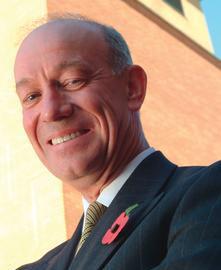"I did labouring during holidays from college. My father was in the construction business, and he got me a job so that I could earn some money. So I was out on site in my boots and hard hat. I was in an underpinning gang – they put me on the mixer with a load of guys. I learned more from those summer holidays than I did during lectures!," says Whale. It was a formative time and he adds that this is when construction 'got into my blood' and set the direction of his career.
Yet Whale is modest about his rise to the level of ceo. When asked if he always had an eye on upper management as his goal, he laughs: "No way. I would like to say it was planned but I didn't really know what I wanted to do. I started as a management trainee at Bovis and went through the Institute of Building route."
Whale has always taken a very practical approach, deciding to continue working and studying at night with a day release, rather than taking up the option to finish his education with a BSc. It's not a decision he regrets: "I finished the course earlier than those who went to university, and considerably further up the career ladder." This is no exaggeration. By the time he was 31, Whale was a main board director of Henry Boot Construction.
Even while he was still a management trainee with Bovis, Whale didn't get to sit in the classroom for long. "After about fifteen months they kicked me out and said, 'You're not going to be a trainee any more, you're going to go and earn your living'. I was sent to work on Aviemore ski resort in Scotland. That was my first real experience – and included being snowed in."
In spite of the frosty start, Whale was with the organisation for eight years, ending up as construction manager on the Worlds End development.
He says that the training offered the advantage of introducing him to many aspects of construction. "When I started as a management trainee, you had to go through all the departments. It wasn't really my choice, they decided for me, and I went with it. I was fortunate at being in what was termed 'special projects', which included everything that was interesting, or a bit difficult."
Whale revealed a talent for dealing with people in difficult situations. He was 'shipped in' to help sort out industrial relations on one project, and to smooth the way with local council representatives on another. Whale refers to his diplomatic ventures jokingly as his 'Kissinger act'.
At 35, Whale joined Balfour Beatty to head its new building company. "Before this they were largely civil engineering contractors. I was also a founder member of Balfour Beatty Developments. It was a good time, and very enjoyable," says Whale.
After almost a decade with Balfour, Whale then moved on to Olympia and York as chief executive and project director for the Heron Quays development at Canary Wharf. His people skills came to the fore, as this was a joint venture with Regalian. "It was the first development joint venture they had done. I had a track record for dealing with these, having been responsible for most of the joint venture developments within Balfour Beatty Developments."
Success at Heron Quays lead to more work on the western segment of Canary Wharf. He managed to win over some tough clients: "When I joined, the Tower was only twenty storeys high. The American clients wanted to know whether I was up to the job. I had to win their recognition and acceptance."
His wide-ranging career has left Whale with no doubts about his vision. "There is an opportunity to take this part of the EMCOR business significantly forward. I enjoy that," he says. "My vision is that all this organisation's skills and long experience should be recognised and promoted. We are involved in construction from the concept, through design, installation, management and maintenance. All through the building life for thirty years or more. We need to do more of that for our clients.
"We are a service, irrespective of whichever facet of the business you look at. We are client-oriented – and that's important."
Source
Building Sustainable Design






















No comments yet